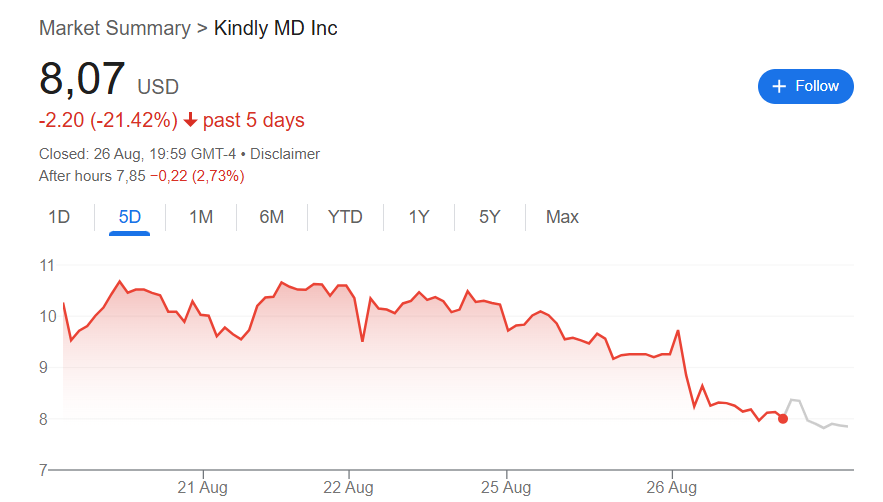TLDR
- KindlyMD filed for a $5 billion stock offering program to fund Bitcoin purchases after buying $679 million worth of Bitcoin
- The company’s stock dropped 12% on Tuesday following the announcement, despite being up 550% this year
- KindlyMD acquired 5,744 Bitcoin at an average price of $118,204 per coin on August 19
- Red Light Holland also updated its Bitcoin strategy by purchasing 10,600 shares of BlackRock’s Bitcoin ETF
- Analysts warn that Bitcoin-focused treasury strategies may drain liquidity from other cryptocurrency markets
KindlyMD shares fell 12% on Tuesday after the healthcare company filed for a $5 billion at-the-market equity offering program. The company plans to use the funds to expand its Bitcoin holdings under its new treasury strategy.

The filing with the Securities and Exchange Commission allows KindlyMD to issue and sell up to $5 billion worth of common stock. The company recently merged with Nakamoto Holdings and adopted Bitcoin as its primary treasury reserve asset.
KindlyMD plans to use the proceeds for general corporate purposes including Bitcoin accumulation, working capital, acquisitions, and capital expenditures. The company will conduct stock sales through multiple agents including TD Securities, Cantor, and others.
“Following the successful completion of our merger between KindlyMD and Nakamoto just two weeks ago and our initial purchase of Bitcoin, this initiative is the natural next phase of our growth plan,” said CEO David Bailey. Bailey also serves as a crypto policy adviser to the Trump administration.
Excited to partner with TD Securities and 9 other leading financial institutions to execute a $5B ATM offering. It’ll take us a while to build the necessary liquidity to complete the program, but it’ll be a critical tool as we execute our strategy. Talk more about it… https://t.co/OiWObZ1Pp1
— David Bailey🇵🇷 $1.0mm/btc is the floor (@DavidFBailey) August 26, 2025
The company made its first major Bitcoin purchase on August 19, acquiring 5,744 Bitcoin for approximately $679 million. The weighted average purchase price was $118,204 per Bitcoin.
Bailey said the offering program will be a critical tool for executing the company’s strategy. He emphasized that building the necessary liquidity will take time but is essential for their Bitcoin accumulation plans.
Stock Performance and Market Reaction
Despite Tuesday’s decline, KindlyMD stock has performed well this year. The shares have surged 330% since early May when the company first announced its Bitcoin strategy plans.
The stock is up 550% for the year overall. After falling 12% during regular trading hours, shares dropped an additional 2.7% in after-hours trading to $7.85.
The filing establishes KindlyMD as a Well-Known Seasoned Issuer, giving the company more flexibility in accessing capital markets. This designation allows for faster and more efficient capital raising but also creates pressure due to large issuance volumes and market volatility risks.
Industry Trend Concerns
KindlyMD joins a growing number of companies adopting Bitcoin treasury strategies. Red Light Holland, a Canadian psychedelic truffles farming company, also updated its Bitcoin investment approach on Tuesday.
Red Light Holland purchased 10,600 shares of the BlackRock iShares Bitcoin Trust ETF. The company is working with a leading exchange to utilize algorithmic trading strategies through Arch Public.
Analysts express concerns about the broader impact of digital asset treasury strategies. The trend may drain liquidity from other cryptocurrency markets as more companies focus exclusively on Bitcoin.
“While DATs bring liquidity to the assets they target, for now this may be at the expense of the wider altcoin market,” said Kelvin Koh from Spartan Group. The model relies heavily on raising equity to buy crypto, creating high exposure to volatility.
When market conditions deteriorate, companies may be forced to sell assets to maintain operations. This could amplify market declines if hundreds of firms pursue the same strategy simultaneously.
The filing allows KindlyMD to distribute various instruments beyond common stock through underwriters in both the US and Canada.








